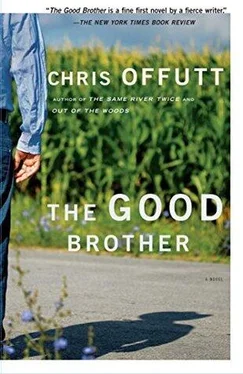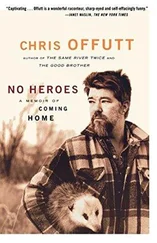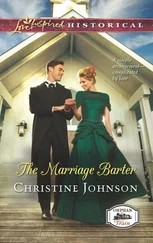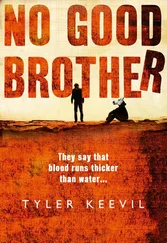A pine knot made a dull explosion in the stove and Joe went outside to gather more wood. It was the most sun in a week and he felt grateful. The brightest light shimmered ahead of him and he trudged through a knee-deep drift to face the sun. A gust blew snow from the boughs of an ancient pine. His face warmed. He closed his eyes. For a moment he forgot himself and wondered how his mother was. Boyd had taken care of her as best he could, a responsibility that Joe had inherited, Marlon would take the role now. She was probably deciding if the giant candy canes made of cardboard would last another Christmas, Joe’s mind moved like lightning to chop that thought short. He opened his eyes. Trees along the peaks were glowing silhouettes.
When his beard was full, he went to town for his driver’s license. The clerk asked for his address.
“I’m in a fishing cabin on Rock Creek,” Joe said.
“Rural route?”
“I don’t know.”
“Mailbox number?”
“It’s Just temporary,” Joe said. “I get mail at a bar.”
“We’ll make it general delivery, Rock Creek,” the man said. “Social Security number? Or do you want your own?”
“My own what?”
“A different number?”
“That’d be fine.”
“I figured so,” the man said. “It takes a little longer.”
Joe wondered if Montanans had a special respect for privacy, or if everyone outside of Kentucky did. He stood awkwardly before the gray background and waited for the camera’s flash, another act that would sever him from home. The state was supplying him with proof of who he wasn’t. The clerk made two photographs and gave Joe the spare. He sat in the waiting area and studied the tiny picture, confused by its resemblance to his brother. Joe didn’t think he looked like Boyd in the flesh, but the picture did. He stared at it for a long time, trying to understand the difference.
The clerk shook Joe’s shoulder.
“Hey, Mr. Tiller. You all right?”
Joe blinked at the man.
“I called you three times,” the man said. “Here’s your new license.”
Joe slipped it in his pocket and left. Outside, he stared at the mountains around the town — his town now, his land and sky. He removed the Kentucky license from his wallet. The picture didn’t look like anyone now. He bent it in half and dropped it down a sewer grate.
He drove through Missoula, trying to understand why people lived in such a tight cluster. He supposed they had more friends than he did, but town only made him lonely. Driving offered comfort, the motion itself a form of solace, and when he reached his cabin, he didn’t want to go in. It was a pathetic-looking little shack, cold and dark, like old man Morgan’s house.
Stricken with panic, he turned away and ran, lifting his legs high of the weedy snow. His breath blew hard. He was the only color in a land of black and white. His foot slipped and he fell and his head bounced against a snow-covered rock. He rolled on his back, waiting for his vision to clear. A silken sky stretched between the mountains, the blue of water overhead. He felt as if he were lying on a beach looking out to sea.
He’d heard that freezing to death was the easiest way to die. You were supposed to get warm after a while and slide into sleep. The snow would cover him like a quilt. He’d never awaken in a strange place again. When he realized where his mind had taken him, he was overwhelmed with terror. He stood and began moving. With no one to turn to, he had to be careful not to turn on himself.
He returned to his Jeep and drove out of the canyon. Spruce boughs drooped beneath the weight of snow. The creek was frozen along the bank, forming a white border for its flow. He met a car and the driver lifted a forefinger in what passed for a wave. Joe was still a stranger, but his vehicle was known.
He stopped at the bar by the interstate and parked beside three cars, one bearing a Buffalo Bills bumper sticker. As he stepped inside the saloon, his head grazed a gigantic moose head hanging from the wall. Below it was a cigarette machine. He sat at the bar, a long slab with high stools placed on a floor covered with peanut shells and sawdust. Slot machines lined the wall. A machine gun was fastened above the bar with Christmas lights hanging from its front sight. Two men shot pool in the back.
The bartender had a stalwart cant to her posture as if she was prepared to withstand rough weather and rougher men. Joe ordered juice, and while she filled a glass, he studied three large squares of posterboard that hung behind the bar. A list of names was crudely printed on each.
“That’s who’s barred,” the bartender said. She pointed to each list in turn. “Barred for a week, barred for a month, and barred for life.”
“What’d they do?” Joe said.
“The first list is for fighting and the second is for coming in with a weapon.”
“What’s the third?”
“Using the weapon.”
She was looking Joe in the eye, a female version of many Montana men, thick-shouldered with no neck, big hands, and a determined attitude — not someone to get riled. The fact of her gender made her more intimidating than the men. She strode away and Joe watched her hips inside her jeans.
The opening door flashed a line of light across the floor as an old man entered. He walked in a peculiar flat-footed way, exerting motion from the hips down, while his face and shoulders remained still Joe wondered if his gait was the result of hours on horseback or a lifetime of walking in high-heeled boots.
The man sat at the other end of the bar.
“Ugliest bartender in the West,” he said.
“Red beer, Coop?” she said.
He swiveled to look at Joe. “One for him, too.”
The bartender half-filled two glasses with tomato juice and poured beer on that. She brought one to Joe. The man lifted his glass in a toast and Joe sipped the drink. It tasted like watered tomato juice with beer’s tang behind it. He joined the old man.
“Hate to drink alone,” Coop said. “Even if I can’t really drink.”
“No?”
“Red beer’s like sending a boy to do a man’s job.”
“How come you can’t drink?”
“Had me a heart attack. Blew the bottom tip right spang off. Doc said it was like an engine threw a rod from running out of oil.”
“That’s rough.”
“Not so bad. They tell me if I eat an egg, not to eat the yolk. About like having a screw without a kiss. Now that’s what you call rough.”
He was wearing a baseball cap with a Buffalo Bills emblem.
“From the East?” Joe said.
“Hell, no. Never been there.”
“Reckon you just like football,” Joe said.
“Professional sports is the fourth worst thing ever happened to this country.”
“It is.”
“Television’s third.”
“I don’t have one.”
“Maybe there’s hope for you yet.”
“What’s the others?” Joe said.
“The second’s both parents having to work just to get by.”
“How about number one?”
“You’re not ready for that yet.”
A fine network of lines crossed Coop’s hands like cracks in an old plate. Each heavy finger held a large gold ring.
“That’s not for show, partner,” Coop said. “And not for fighting either. That’s gold. This hand is worth more than a credit card. Paper money used to be good for gold, but not since the thirties. Now plastic stands for cash. You know most of the money in the world don’t exist?”
“I didn’t know that.”
“Don’t exist at all. All money is blood money, but only gold is real. That’s why there’s sawdust on the floor.”
“I don’t get you.”
“In the old days, people bought drinks with gold dust. At the end of the night, the owner swept the sawdust and sifted it for gold dust. Gold’s not much count. Bends too easy and won’t hold an edge. But you can trust it for value.”
Читать дальше












